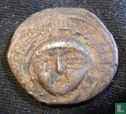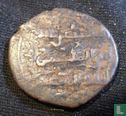

Enlarge image


Catalogue information
LastDodo number
6650241
Area
Coins
Title
Artuqids of Mardin AE dirham (AH606-632) 1213-1239
Country
Face value
Year
1225
Variety / overstrike
Head of State
Type
Designer
Series
Theme
Material
Weight
10.7
Diameter
23
Thickness
Punch
Shape
Obverse
( Nasir al-Din )
Reverse
( Ayyubid overlord al-Kamil Muhammad )
Edge
Privy mark
Mint mark
Number produced
Krause and Mishler number
Catalogue number
Artuk 77 var, SS 42.2, A 1830.6 R
Details
The Artquids (sometimes spelled as Artukid, Ortoqid, or Ortokid) were a Turkmen dynasty that ruled in Eastern Anatolia, Northern Syria and Northern Iraq in the eleventh and twelfth centuries. The Artuqid dynasty took its name from its founder, Zaheer-ul-Daulah Artuk Bey, who was of the Döger branch of the Oghuz and ruled one of the Turkmen atabeyliks of the Seljuk Empire.
The dynasty was founded by Artuk Bey, son of Eksük, a general originally under Malik Shah I and then under the Seljuq emir of Damascus, Tutush I. Tutush appointed Artuq governor of Jerusalem in 1086. Artuq died in 1091, and his sons Sökmen and Ilghazi were expelled from Jerusalem by the Fatimid vizier al-Afdal Shahanshah in 1098; the Fatimids lost the city to the crusaders the following year.
Sokman and Ilghazi set themselves up in Diyarbakır, Mardin, and Hasankeyf in the Jezirah, where they came into conflict with the sultanate of Great Seljuq. Sokman, bey of Mardin, defeated the crusaders at the Battle of Harran in 1104. Ilghazi succeeded Sokman in Mardin and imposed his control over Aleppo at the request of the qadi Ibn al-Khashshab in 1118. In 1119 Ilgazi defeated the crusader Principality of Antioch at the Battle of Ager Sanguinis.
In 1121 a Seljuq-Artuqid alliance, commanded by Mehmed I of Great Seljuq and Ilghazi, was defeated by the Kingdom of Georgia at the Battle of Didgori. Ilghazi died in 1122, and although his nephew Balak nominally controlled Aleppo, the city was really controlled by Ibn al-Khashshab. Al-Kashshab was assassinated in 1125, and Aleppo fell under the control of Zengi of Mosul. After the death of Balak, the Artuqids were split between Harput, Hasankeyf and Mardin. Sokman's son Davud, bey of Hasankeyf, died in 1144, and was succeeded by his son Kara Aslan. Kara Aslan allied with Joscelin II of Edessa against the Zengids, and while Joscelin was away in 1144, Zengi recaptured Edessa, the first of the Crusader states to fall (see Siege of Edessa). Hasankeyf became a vassal of Zengi as well.
Kara Aslan's son Nur ad-Din Muhammad allied with the Ayyubid sultan Saladin against the Sultan of Rum Kilij Arslan II, whose daughter had married Nur ad-Din Muhammad. In the peace settlement with Kilij Arslan, Saladin gained control of the Artuqid territory, even though the Artuqids were still technically vassals of Mosul, which Saladin did not yet control. With Artuqid support, however, Saladin eventually took control of Mosul as well.
The Artuklu dynasty remained in nominal command of upper Mesopotamia, but their power declined under Ayyubid rule.



